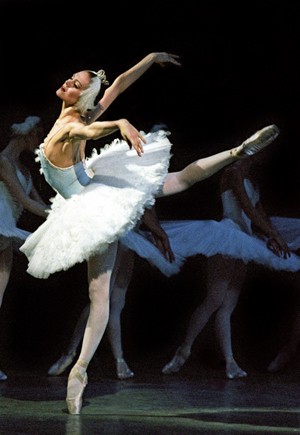|
Reviews of Recent Independent, Foreign, & Documentary Films in Theaters and DVD/Home Video
Directed by Bertrand Normand Produced by Frédéric Podetti & Yann Brolli Released by First Run Features Russian with English subtitles France. 77 min. Not Rated Ballerinas are pretty, but ballet itself can be ugly. The lives of ballerinas are as tough as those of a professional athlete. Their bodies undergo the same kind of relentless pounding as a football or basketball player; their minds are put through the same grueling learning process as a pitcher or a hitter, relentlessly memorizing and making the tiniest of adjustments to perfect technique and timing. Then on top of all the physical work, they must also be able to express emotions through their bodies, and, most elusive of all, project “star quality,” that ineffable something that lights up a stage. Bertrand Normand profiles several young Russian ballerinas of the Mariinski (formerly Kirov) Theatre, who are at different points in their careers. Although interest in classical dance is waning around the world, the Russian ballerina still has an iconic status internationally, and especially in Russia, where they are stars on par with actresses and athletes. Manuel Legris, a dancer with the Paris National Ballet, says, “You can always tell a Russian ballerina…they are more vibrant…more extreme.” As Normand shows in scenes shot at the Vaganova Ballet Academy, many girls aspire to be ballerinas, but their careers can end brutally quickly. Nine-year-old girls learn their dreams are over because they don’t have the right body type; others have to drop out because of debilitating injuries, loss of desire, or the simple realization that they have gone as far as they can go. The search for perfection is lifelong for dancers (though an actual dancing life is short—a ballerina can become a professional in her late teens, and her career is over by 40, if she is extremely lucky). One of the dancers explains that each time a dancer performs a piece, no matter how many times she’s danced it, she is still looking for a way to improve it, to change it, to make it better, and different. Sometimes it can be too much. Diana Vishneva is an international star who performs with several companies. But she questions sometimes whether she can go on. Ulyana Lopatkina, considered one of the greatest talents in Russia, had to stop dancing completely for two years due to an injury, and then, once she realized she still wanted to dance, had to go through the process of retraining her body again. Two of the younger company members have their own choices to make. Although identified as one of the up-and-coming talents of the company and given a chance to perform her first solo in Swan Lake, Alina Somova seems perpetually in fear of having it all come to an end, her face clouded with worry at every correction from a teacher. Meanwhile, Evgenia Obraztsova, another young dancer on the rise, has a chance to act in a film; although she maintains that ballet is her first love, one wonders how long she will put herself through the battle for ballet perfection if a film career becomes an option. Normand’s
film is pretty simple, a standard fly-on-the wall documentary mixed with
talking heads and interviews. There’s nothing groundbreaking in style,
but nothing disastrous. So that makes the verdict on this film pretty
simple. If you don’t like ballet or don’t get ballet, you won’t have any
patience with it. If you do like ballet (or what the heck, if you just
like looking at pretty girls in skimpy clothes), then you’ll be
fascinated by this glimpse into the lives of the dancers. I, for one,
always thought the backstage lives of dancers were more interesting than
the actual dancers, so I couldn’t have been more pleased.
Kirsten Anderson
|


